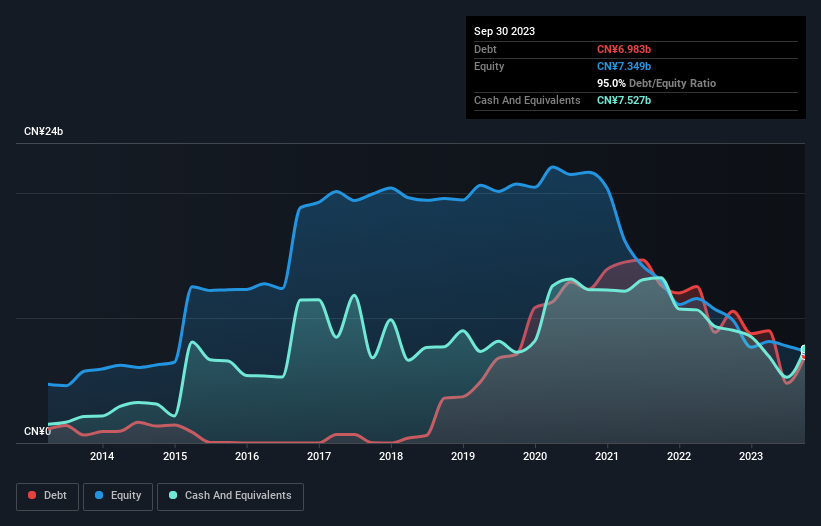
Howard Marks put it nicely when he said that, rather than worrying about share price volatility, 'The possibility of permanent loss is the risk I worry about... and every practical investor I know worries about.' When we think about how risky a company is, we always like to look at its use of debt, since debt overload can lead to ruin. We can see that Yonghui Superstores Co., Ltd. (SHSE:601933) does use debt in its business. But is this debt a concern to shareholders?
When Is Debt Dangerous?
Debt assists a business until the business has trouble paying it off, either with new capital or with free cash flow. Part and parcel of capitalism is the process of 'creative destruction' where failed businesses are mercilessly liquidated by their bankers. However, a more frequent (but still costly) occurrence is where a company must issue shares at bargain-basement prices, permanently diluting shareholders, just to shore up its balance sheet. By replacing dilution, though, debt can be an extremely good tool for businesses that need capital to invest in growth at high rates of return. The first step when considering a company's debt levels is to consider its cash and debt together.
See our latest analysis for Yonghui Superstores
What Is Yonghui Superstores's Net Debt?
You can click the graphic below for the historical numbers, but it shows that Yonghui Superstores had CN¥6.98b of debt in September 2023, down from CN¥10.5b, one year before. But on the other hand it also has CN¥7.53b in cash, leading to a CN¥543.7m net cash position.

How Healthy Is Yonghui Superstores' Balance Sheet?
We can see from the most recent balance sheet that Yonghui Superstores had liabilities of CN¥25.3b falling due within a year, and liabilities of CN¥22.0b due beyond that. Offsetting this, it had CN¥7.53b in cash and CN¥2.35b in receivables that were due within 12 months. So its liabilities total CN¥37.4b more than the combination of its cash and short-term receivables.
The deficiency here weighs heavily on the CN¥20.7b company itself, as if a child were struggling under the weight of an enormous back-pack full of books, his sports gear, and a trumpet. So we definitely think shareholders need to watch this one closely. After all, Yonghui Superstores would likely require a major re-capitalisation if it had to pay its creditors today. Given that Yonghui Superstores has more cash than debt, we're pretty confident it can handle its debt, despite the fact that it has a lot of liabilities in total. There's no doubt that we learn most about debt from the balance sheet. But it is future earnings, more than anything, that will determine Yonghui Superstores's ability to maintain a healthy balance sheet going forward. So if you want to see what the professionals think, you might find this free report on analyst profit forecasts to be interesting.
Over 12 months, Yonghui Superstores made a loss at the EBIT level, and saw its revenue drop to CN¥81b, which is a fall of 12%. That's not what we would hope to see.
So How Risky Is Yonghui Superstores?
While Yonghui Superstores lost money on an earnings before interest and tax (EBIT) level, it actually generated positive free cash flow CN¥4.9b. So taking that on face value, and considering the net cash situation, we don't think that the stock is too risky in the near term. Given the lack of transparency around future revenue (and cashflow), we're nervous about this one, until it makes its first big sales. To us, it is a high risk play. For riskier companies like Yonghui Superstores I always like to keep an eye on the long term profit and revenue trends. Fortunately, you can click to see our interactive graph of its profit, revenue, and operating cashflow.
Of course, if you're the type of investor who prefers buying stocks without the burden of debt, then don't hesitate to discover our exclusive list of net cash growth stocks, today.
New: Manage All Your Stock Portfolios in One Place
We've created the ultimate portfolio companion for stock investors, and it's free.
• Connect an unlimited number of Portfolios and see your total in one currency
• Be alerted to new Warning Signs or Risks via email or mobile
• Track the Fair Value of your stocks
Have feedback on this article? Concerned about the content? Get in touch with us directly. Alternatively, email editorial-team (at) simplywallst.com.
This article by Simply Wall St is general in nature. We provide commentary based on historical data and analyst forecasts only using an unbiased methodology and our articles are not intended to be financial advice. It does not constitute a recommendation to buy or sell any stock, and does not take account of your objectives, or your financial situation. We aim to bring you long-term focused analysis driven by fundamental data. Note that our analysis may not factor in the latest price-sensitive company announcements or qualitative material. Simply Wall St has no position in any stocks mentioned.
About SHSE:601933
Good value with moderate growth potential.
Market Insights
Community Narratives



